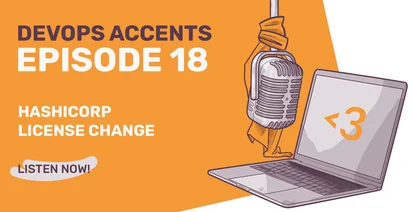HashiCorp License Change |🎙️#18

In this episode of DevOps Accents, Pablo, Leo and Kirill discuss HashiCorp adopting Business Source License.
- The business of HashiCorp;
- What is competitive offering?
- Is this change fair for the open source community?
- Will Terraform be forked?
- Look what happened to CentOS!
- RedHat and Linux vs. Hashicorp and Terraform: what's the difference?
- Google vs. Amazon reaction;
- Who's happy with this decision?
You can listen to episode 18 of DevOps Accents on Spotify, or right now:
In a recent discussion focused on the shifting dynamics within the DevOps and cloud technology sphere, particularly around HashiCorp's new licensing model, a comprehensive exploration unfolded. The conversation, facilitated by industry insiders Pablo, Leo, and Kirill, delved into the implications for both corporate and individual contributors in the field of DevOps and cloud technologies. This article aims to encapsulate the essence of their dialogue, presenting a nuanced view of the changes and their potential impact on the ecosystem.
Understanding HashiCorp's New Licensing Model
HashiCorp, a cornerstone in the realm of DevOps tools, announced changes to its licensing model, stirring a mix of reactions across the community. This shift primarily targets the commercial use of their tools, introducing a new licensing scheme that delineates between individual and business use. The underlying goal appears to be a balancing act between remaining accessible to the broader community while securing a sustainable revenue model through corporate engagements.
Corporate Perspective vs. Community Impact
The conversation highlighted a dual perspective on the issue. From a corporate standpoint, the move is seen as a strategic step towards financial viability and market consolidation. HashiCorp, despite its significant contributions and widespread adoption, faces the quintessential challenge of monetizing open-source projects. The new model is a bid to enhance revenue streams without alienating the individual developers and small-scale users who form the backbone of their community support.
However, this transition has raised concerns about the long-term ramifications for the open-source ethos that HashiCorp was built upon. Contributors and users worry about the potential gatekeeping effect this could have on innovation and collaboration within the ecosystem. The fear is that such changes might prioritize commercial interests over community-driven development, altering the landscape of open-source contributions.
Navigating the New Landscape
For businesses leveraging HashiCorp's tools for commercial projects, this change necessitates a reassessment of their usage and potential financial obligations. Companies must now navigate the fine line between utilizing these tools for internal operations versus offering derived services that directly compete with HashiCorp's commercial offerings.
Furthermore, the discussion broached the topic of alternative solutions and the possibility of community forks. This scenario mirrors historical precedents where licensing changes have led to forks of popular tools, ensuring their continued availability under open-source terms. It underscores the dynamic nature of the open-source model, where community resilience often finds ways to adapt and maintain access to essential tools.
Conclusion: An Evolving DevOps Ecosystem
As the DevOps landscape continues to evolve, HashiCorp's new licensing model serves as a poignant reminder of the complexities inherent in balancing open-source ideals with commercial success. While the immediate impact might seem daunting, particularly for smaller entities and independent developers, the broader implications highlight a community adept at navigating change. As discussions like these unfold, they not only address the immediate concerns but also foster a deeper understanding and preparedness for the future of open-source innovation in the cloud technology domain.
For those in the DevOps and cloud technology sectors, staying informed and engaged with these developments is crucial. As the ecosystem adapts, opportunities for innovation and collaboration continue to emerge, underscoring the importance of dialogue and community input in shaping the future of technology.
Podcast editing: Mila Jones, milajonesproduction@gmail.com
